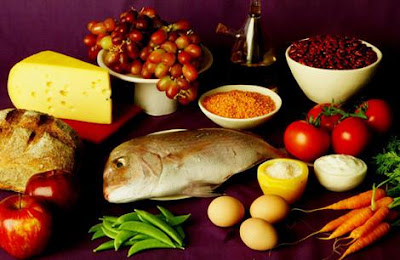
Healthy eating is the most effective and least expensive preventive health measures we can take.
Here’s our list of Super foods. Tape it to the fridge, and make an extra copy to bring with you when you go grocery shopping. It’s not necessary to eat everything every day, but if you use this list to plan meals and menus, you’ll be eating from among the healthiest foods in the world.
Blueberries: They contain more antioxidants than any other fruit. One cup a day helps improve and preserve eyesight, and prevents cancer, diabetes, and age-related memory loss. Blueberries also contain a compound that has been shown to lower cholesterol as effectively as commercial drugs, with no side effects. Blueberries are the best choice, but strawberries, raspberries, blackberries, purple grapes, prunes and raisins are also good.
Coldwater fish: Salmon, mackerel, herring, tuna, and sardines contain Omega-3 fatty acids. Two to three servings a week lowers the risk of heart disease and cancer, helps fight arthritis, and has been shown to improve memory, reasoning, and focus. Don’t like fish? Dark green, leafy vegetables, flax seeds, hemp seeds, walnuts, seeds, eggs, and a variety of vegetable oils also provide Omega 3s, but in smaller amounts.
Nuts & Seeds: Walnuts are the #1 nut source of Omega-3s and anti-inflammatory polyphenols. All nuts are high in vitamin E. which prevents and slows cognitive decline, and promotes skin elasticity. Aim for one ounce a day raw or roasted. Good choices include almonds, pistachios, cashews, peanuts, sunflower seeds, sesame seeds, flax seed, and non-hydrogenated nut butters like peanut butter and tahini.
Avocados: They lower blood pressure, which promotes brain health. Eating ¼ to ½ a day also provides fiber, minerals, iron, potassium and healthy fat.
Citrus fruit: The Vitamin C in oranges, grapefruits, lemons and limes helps in the formation of collagen, the protein that keeps skin firm and reduces wrinkles.
Pomegranate fruit or juice: This fruit offers potent antioxidants that protect the brain from free radicals. Pomegranate juice has added sugar (to counteract its natural tartness), so don’t overdo it. Drink two ounces a day, diluted with plain water, or eat ¼ of a fresh fruit.
Tea: Two to three cups a day of freshly brewed white, green or black tea can enhance memory and focus, and provide potent antioxidants, which promote healthy blood flow and halt cellular damage. Studies have found a link between consuming green tea and a reduced risk for several cancers.
Dark chocolate: Look for a minimum of 70% cocoa. Unfortunately, more is not better. An ounce a day provides powerful antioxidant properties and natural stimulants, including caffeine, to enhance focus and concentration, and activate mood boosting endorphins.
Yogurt: Research shows that aging is accelerated by unfriendly bacteria in the intestines. Yogurt seems to destroy such bacteria. This might explain the longevity of ethnic groups whose diet contains a lot of yogurt. Make sure the label says “active cultures.”
Legumes: Beans, peas, and lentils are great for your heart, full of antioxidants, low in calories and high in protein and fiber. Black beans have the added bonus of boosting brain power. Eat one cup a day and break a little wind, it doesn’t contribute to greenhouse gases.
Leafy greens: Spinach is a great source of plant based omega-3 and folate, which lowers the risk of heart disease, stroke and osteoporosis. Folate also increases blood flow to the penis. Could this be why Popeye was so addicted to it? Eat broccoli, bok choy, kale, and romaine lettuce too.
Pumpkin: It’s not just for pie anymore! It’s loaded with iron, fiber, vitamin C, potassium, and beta carotene. Pumpkin’s antioxidants protect cells from oxidative damage that causes aging. One study confirmed that subjects absorbed less fat and calories from their food when pumpkin was included in their diet; another is showing evidence that a substance in pumpkin reacts like ACE inhibitors (drugs used to treat blood pressure and heart disease).
Tomatoes: The red ones contain lycopene, which decreases the risk of bladder, lung, prostate, skin, and stomach cancers. Watermelon, pink grapefruit, persimmon and papaya are good substitutes.
Sprouts: These are a concentrated source of the living enzymes that are lost when we cook foods. As we age, our body’s ability to produce enzymes declines. In addition, sprouts are a highly nutritious source of protein and vitamin C.



No comments:
Post a Comment